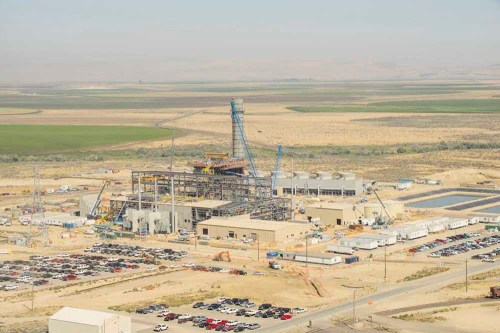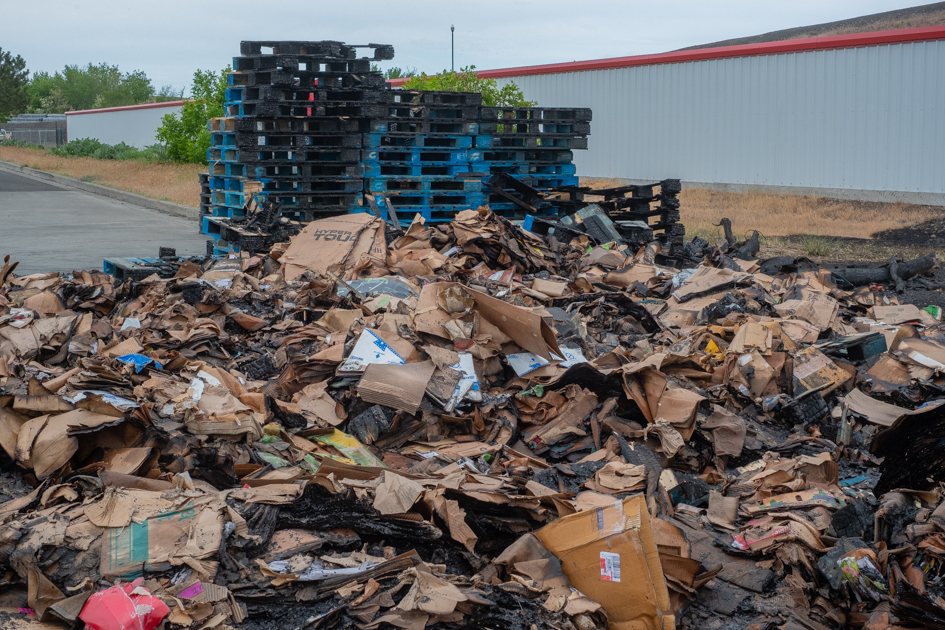Environmental groups oppose PGE request to increase pollution at Boardman power plant
Published 5:00 pm Friday, December 24, 2021

- Construction of the Carty Generating Station as seen in August 2015.
BOARDMAN — Portland General Electric’s request to increase pollution at its Boardman fracked gas power plant drew fierce opposition from public health and environmental advocates.
PGE’s proposal to significantly increase toxic emissions at Carty Generating Station had its final public hearing Dec. 17.
If the Oregon Department of Environmental Quality grants the request to modify emissions at the 440-megawatt, fracked-gas power facility in Boardman, carbon monoxide and volatile organic compound output will increase significantly.
The modifications would amount to a 300% increase in CO levels and more than 800% for volatile organic compounds,, according to an October report from Columbia Riverkeeper.
“DEQ’s current plan to exempt fracked-gas power plants like Carty from its so-called ‘Climate Protection Program’ means DEQ should be doing more to rein in pollution,” stated Columbia Riverkeeper.
“Calling the site a ‘fracked-gas plant’ is not entirely accurate,” stated PGE spokesperson Allison Dobscha in an email to Columbia Insight. “Both fracked and unfracked gases are transported through the same pipelines, so the natural gas we use to generate power at Carty comes from a combination of sources. This permit … reflects updated technical data and won’t result in any actual modifications to the plant. The updated permit also establishes more stringent short-term emissions limits than the previous version.”
When it opened in 2016, the Carty Plant was viewed as an emissions improvement over its neighboring predecessor, PGE’s Boardman Coal Plant, sharing the same location about 15 miles southwest of Boardman and the Columbia River.
PGE shut down the plant in late 2020, making it the last coal-burning power plant in Oregon to cease operations. The plant released an estimated 2 million tons of greenhouse gas emissions per year, according to PGE.
“Part of the purpose of (closing BCP, opening Carty) is to move away from coal and move toward cleaner energy resources,” a PGE communications consultant told Oregon Public Broadcasting late last year. “One of our long-term goals is to reduce greenhouse gas emissions by more than 80% by 2050.”
Dobscha noted PGE has since updated its clean energy targets, aiming to “achieve zero GHG emissions from power served to customers by 2040.”
A three-fold increase in carbon monoxide and an eight-fold increase in volatile organic compounds amounts to “a massive increase in air pollution … and a proposal that deserves more investigation,” wrote Dan Serres, Columbia Riverkeeper conservation director. “VOCs are of particular concern because they combine with nitrogen oxides and sunlight to form low-level ozone (smog).”
Columbia Riverkeeper in a press release Monday, Dec. 20, stated community members and activists submitted thousands of comments to DEQ in opposition to PGE’s request.
“In addition to the thousands of comments submitted by individuals, Columbia Riverkeeper joined 14 other community and environmental justice organizations in calling on DEQ to deny PGE’s request,” according to the press release. “The groups highlighted the significant threat this pollution increase will place on surrounding communities — which are disproportionately low-income and Black, Indigenous, and People of Color communities — and urged DEQ to take aggressive action to reduce Carty’s emissions limits and protect surrounding communities from increased exposures.”
Kate Murphy, community organizer with Columbia Riverkeeper, said in the release the focus must be on aggressive pollution reductions, not clearing the way for more harmful pollution.
“PGE’s proposal to increase harmful pollution is a serious environmental justice issue and is a danger to public health and our shared environment,” according to Murphy. “Thousands of community members have spoken up in opposition, and DEQ is obligated to protect our communities and our air from this threat.”
Peter Cornelison, Friends of the Columbia Gorge field representative and Hood River resident, added his voice to the opposition.
“The Columbia River Gorge National Scenic Area and its communities are plagued by air pollution from several sources, including the Carty Generation Station,” Cornelison said in the press release. “The Oregon DEQ must carry out its mandate to improve air quality in the Columbia Gorge and deny PGE’s request to increase its pollution.”
According to PGE, the emissions modification at Carty Generating Station is necessary due to both the closure of the Boardman Coal Plant and new information about emissions levels needed to run the power plant according to its normal schedule and capacity.
— The East Oregonian contributed to this report.





